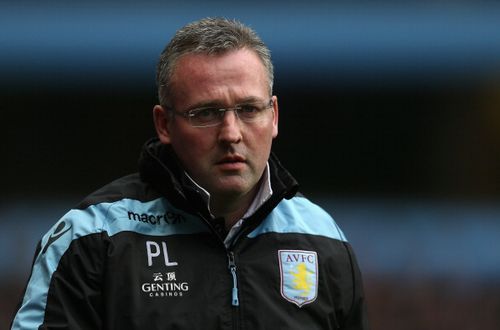
The Villans make late surge to keep the Lambert plan alive
On March 1st, Aston Villa announced their accounts for 2011/2012, which gave a firm insight into their decline from successive sixth place finishes under Martin O’Neil to relegation candidates under Alex McLeish and now Paul Lambert.
Under O’Neil, the wage bill climbed to £71 million, accounting for 85% of the club’s annual turnover and, having spent £120 million on transfers over the Irishman’s four-year reign, the club posted at fourth highest, behind only Manchester City, Chelsea and Stoke.

Aston Villa manager Paul Lambert’s youth policy is slowly but surely being vindicated. (Getty Images)
Chairman Randy Lerner, who had grown a reputation as one of the more generous of the Premier League’s ownership gentry, turned to frugality in order to prevent the club’s finances from spiralling out of control.
O’Neill was dispensed with, Stewart Downing and Ashley Young were both sold for a combined £35 million, and the club’s losses for the year 2011/2012 were reduced from £54 million to £18 million. The wage bill was also cut by £13.8 million as the American severely downsized in order to safeguard the long-term future of the club.
Part of that has included the managerial transition from O’Neil to Paul Lambert via the short term reigns of Gerard Houllier and Gary Mcallister and then Alex McLeish. Lambert, who had achieved a double promotion and Premier League consolidation with little other than a shrewd knowledge of the lower leagues and an eye for a bargain, was the perfect fit as Lerner strived to eradicate the reckless days of spending £6 million on Fabian Delph.
Delph has struggled since his big money move as a 19-year-old back in 2009, but he still remains at Villa Park as part of Lambert’s new generation, alongside 21-year-old Matthew Lowton and 22-year-old Ashley Westwood, signed in the summer from Sheffield United and Crewe Alexandra respectively.
Joe Bennett, a 21-year-old left-back, was signed from Middlesborough to join the likes of Ciaran Clark, Nathan Baker, Barry Bannan and Marc Albrighton, all under the age of 23, as Villa chose to build again with an emphasis on youth rather than the established stars (Downing, Bent) that would have put a strain on the wage-bill.
Lerner did back Lambert enough for him to fork out £7 million for Belgian Christian Benteke, a striker, fitting the bill, at the age of 22, as an ambitious young player built for the future. His 17 goals this season have been a revelation, with none more important than the winner he netted in Saturday’s hugely important victory over QPR.
Villa moved six points clear of the relegation zone with that 3-2 win to greatly allay fears that a drop into the Championship would dismantle Lambert’s long-term vision before it had barely begun.
The transition from the ill-fated year-long reign of Alex McLeish, in which Villa scarcely avoided relegation, has been a very shaky process. 56 goals have been shipped, the worst tally in the league, as Lambert has seen his team’s inexperience exploited enough for them to be mired in relegation trouble throughout the season.
Elimination in the FA Cup to Millwall of the Championship, and in the League Cup to Bradford City, have provided an embarrassing side-track to a poor campaign in which Lerner’s patience with Lambert has already been tested.
The potential of Westwood, Benteke, Lowton and Co. together with Lambert’s appreciation for measured spending, has seen Lerner refuse to buckle and resort to a managerial change for the third time in three years.
Sensible spending and continuity is now the key at Villa Park, and that approach is close to reaping short-term reward as the Villa ship, immersed in choppy waters throughout the season, steers towards safety.
Westwood, the centre-midfield play-maker, has become integral to Lambert’s set-up despite having never previously consistently played higher than tier four with Crewe Alexandra. He has made 20 appearances and registered an average passing percentage of 85%.
Against QPR, having attempted 74 passes, he completed 99% of them. Despite the lack of experience alongside of him, his partnerships have been formed with Delph and Bannan, as Stiliyan Petrov remains sidelined with his fight against leukaemia; he has grown into a cultured Premier League midfielder.
Such is his improvement, and the vibrant performances of Lowton, Benteke and Andreas Wiemann, that bodes well for the future. Lambert’s faith in youth has been immovable throughout, trusting them instead of the elder statesmen of Charles N’Zogbia and Darren Bent, starting a combined total of just 16 games so far this season, is now beginning to pay-off with the utmost vindication to Lerner and his now restricted spending plan which saw fit to appoint Lambert in the first place.
Lambert’s long-term vision, which has been tasked with turning around Villa’s poor performances on the pitch under McLeish, together with continuing to maintain a stringent eye on Villa’s previously obscene spending plan, looks like it could have earned itself a second year.
It is no less than the Villa hierarchy deserve for, while so many other clubs delve into unmanageable amounts of debt as they battle to compete at the very top, refusing to abandon with their rebuilding process.
Benteke’s winner over QPR could have been a pivotal moment in a bright future on and off the pitch.